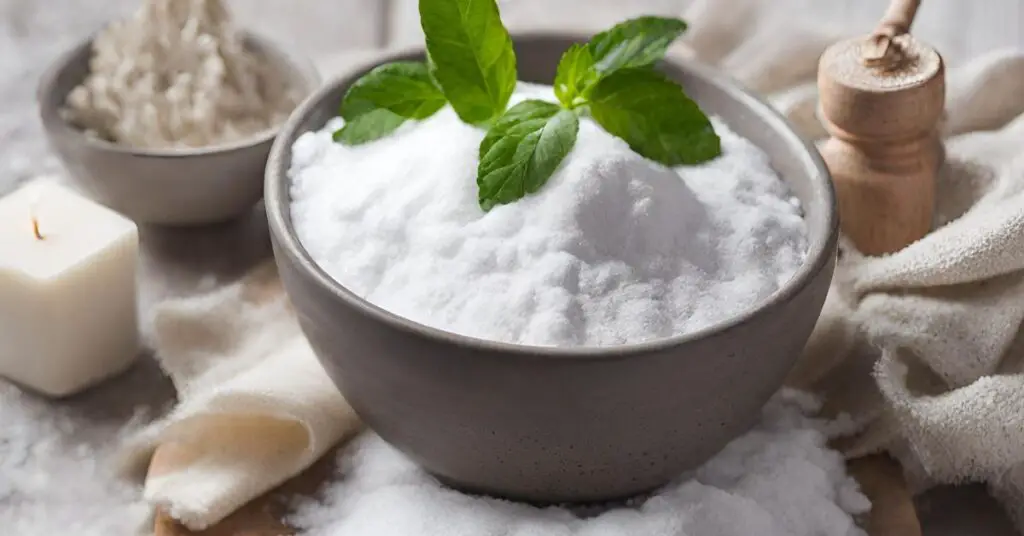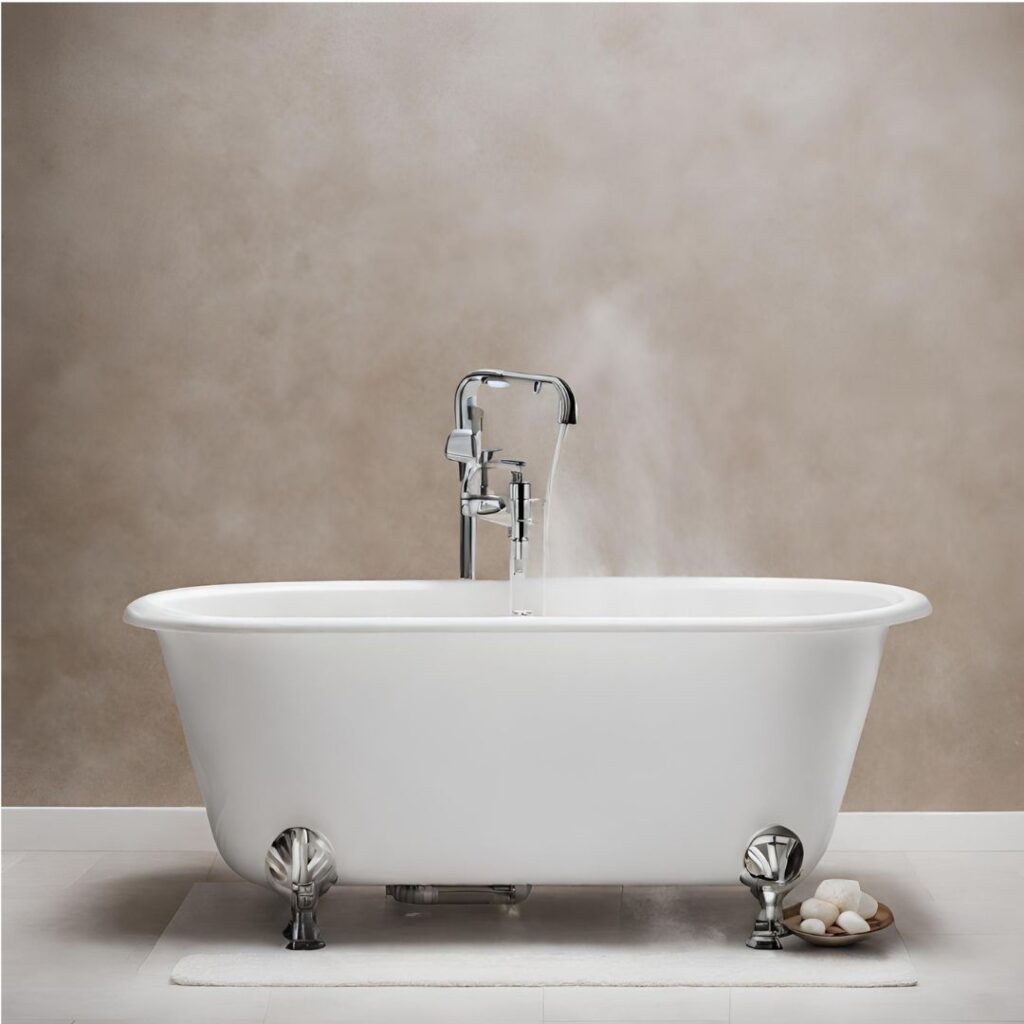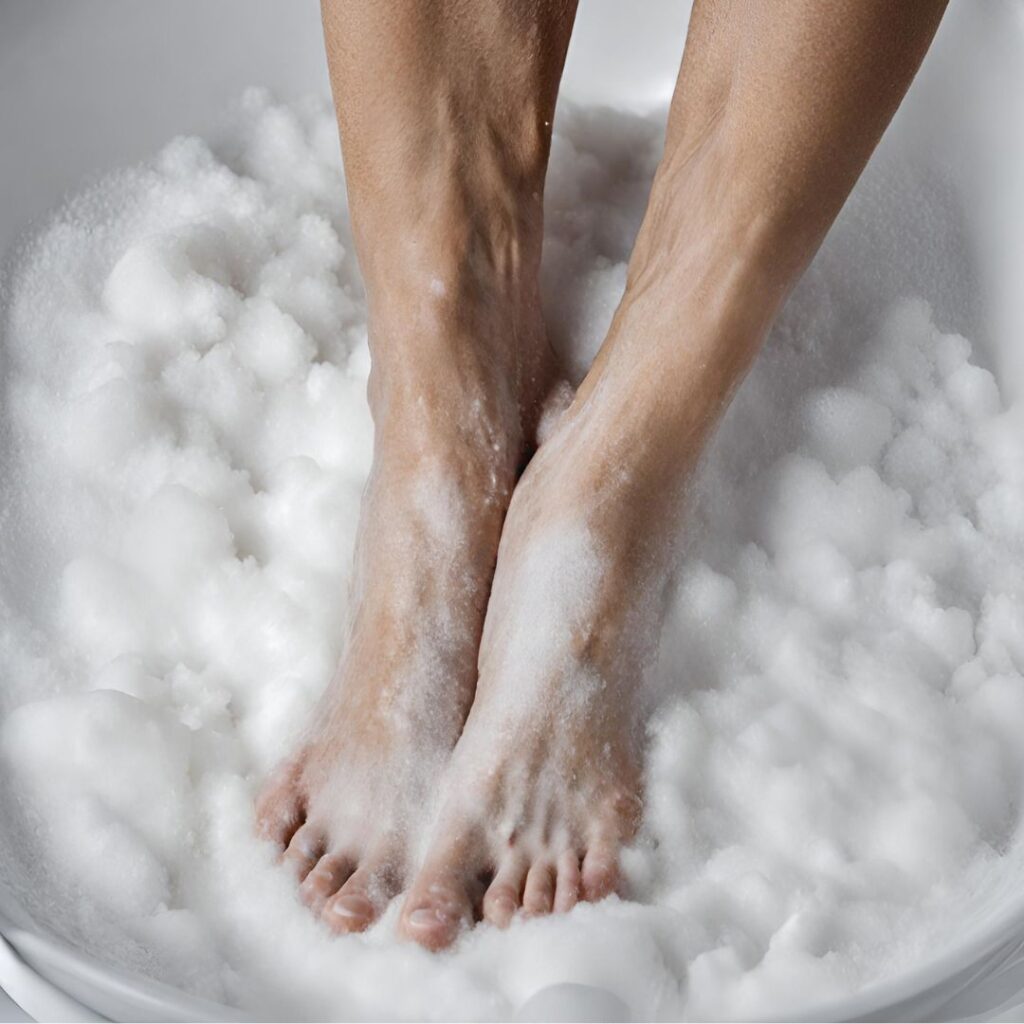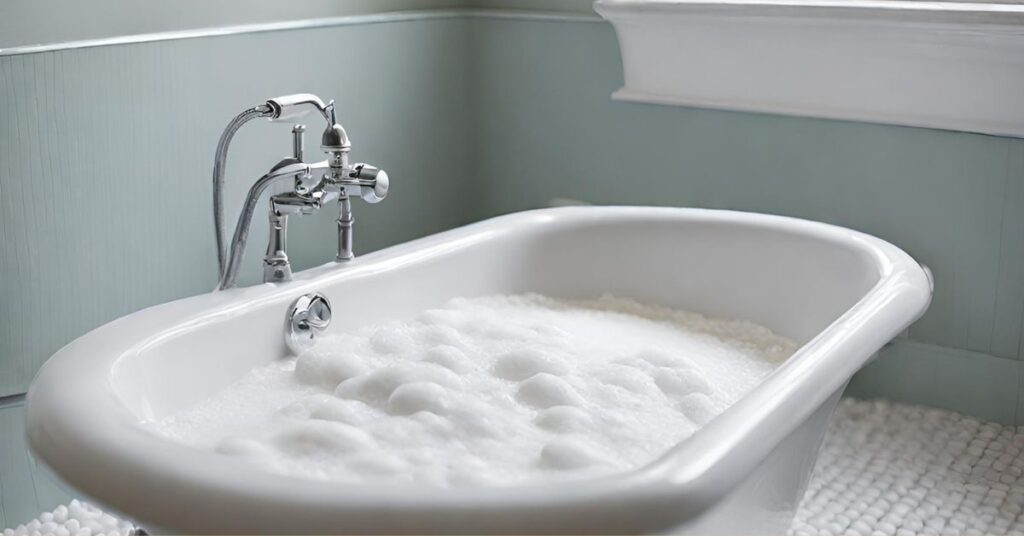The age-old remedy of adding baking soda in bath water has garnered attention for its purported skin benefits and overall relaxation properties. As you draw a warm bath, the idea of sprinkling in this common kitchen ingredient might be tempting. But is it the panacea many claim it to be?
Before you turn your tub into a fizzy spa retreat, it’s essential to delve deep into what baking soda truly offers. From the potential benefits to the cautionary tales, let’s navigate the world of baking soda baths to determine whether it’s a worthy addition to your self-care routine.
Use links below for easy navigation
What Is a Baking Soda Detox Bath?

A baking soda detox bath is a relaxing and rejuvenating soaking experience that involves adding baking soda to warm water.
Baking soda, scientifically known as sodium bicarbonate, is believed to have detoxifying properties. Dissolved in a bath may help draw out toxins from the body, balance pH levels, and soothe skin irritations.
Many people enjoy adding essential oils or Epsom salt to enhance the benefits of the bath.
Baking soda in bath water is the most inexpensive yet amazingly beneficial remedy for itchy skin and sore muscles, and it calms the nervous system by encouraging better sleep patterns.
Related: Can You Use Epsom Salt in a Jetted Tub?
Benefits of Baking Soda in Bath Water
Baking soda is known for its versatility and wide range of uses for its various properties, including the alkaline nature that helps in cleaning.
People have started using it in bath water because of its surprising health benefits. Let’s delve deep into what it offers!
Exfoliates Dead Skin Cells
Baking soda helps exfoliate dead skin cells by adding to bath water. The alkaline property of baking soda acts as a natural, gentle abrasive that helps remove the top layer of dull, dead skin cells.
By removing these cells, the skin’s natural regeneration process is stimulated, resulting in smoother and brighter skin. Combining baking soda with Epsom salt in a bath can further enhance its exfoliating properties by softening the skin and relaxing stiff muscles.
Reduces Inflammation
When lactic is accumulated in muscles it causes pain and inflammation which can be cured by something of alkaline nature.
Luckily, baking soda has that power and helps balance the pH level. Soaking yourself 20-30 minutes in baking soda detox bath water may help reduce inflammation.
Related: Best Jacuzzi Tubs
Relaxes Stiff Muscles
Baking soda baths are known for their ability to not only provide relaxation but also help exfoliate the skin and relax stiff muscles.
The warm water in the bath, combined with the mild antiseptic properties of baking soda, creates a soothing environment that can ease muscle tension and promote relaxation.
Related: Most comfortable freestanding bathtubs
Soothes Itchy Skin and Fungal Infection
Baking soda’s alkaline nature helps balance skin pH, potentially reducing irritation and soothing itchy sensations.
Its mild antiseptic properties can also curb itch-causing bacteria and fungi growth. Combined with warm bath water, baking soda creates a calming environment, softening and mildly exfoliating the skin to alleviate itchiness further.
Heals Rashes of Poison Ivy
Baking soda in bath water can provide relief from the itching and discomfort associated with poison ivy rashes.
A baking soda bath can help dry out blisters and reduce inflammation, offering relief from symptoms.
Relieves Diaper Rash
For infants and toddlers, a lukewarm bath with baking soda can help soothe the redness and irritation caused by diaper rash. Its gentle antiseptic properties can keep infections at bay, while its soothing qualities reduce discomfort.
Always ensure the water is at a safe temperature for young skin and consult with a pediatrician for persistent rashes.
Balances PH Level
Baking soda, with its alkaline properties, can play a role in balancing the pH level of the skin. This is particularly advantageous for individuals experiencing skin irritation or inflammation caused by conditions that thrive in acidic environments.
Baking soda can help promote skin health and relieve discomfort by restoring pH balance.
Reduces Urinary Tract Infection (UTI) Pain
While baking soda baths cannot cure UTIs, they can offer some relief from the painful symptoms. The alkaline environment can help soothe the urethral opening, which often becomes irritated and painful during a urinary tract infection.
However, it’s essential to consult a doctor for appropriate treatment if you suspect a UTI.
How to Prepare a Baking Soda Bath?

Preparing a baking soda bath is a simple and easy process that can be done using the following steps:
- Gather Ingredients: You will need baking soda (sodium bicarbonate), warm water, and optional additions such as essential oils or Epsom salt.
- Fill the Bathtub: Start by filling your bathtub with warm water. The water should be comfortably warm, but not too hot, to avoid drying out your skin.
- Add Baking Soda: Measure out 1/2 to 1 cup of baking soda, depending on your preference and the size of your bathtub. Baking soda is alkaline and can help balance the pH of your skin.
- Dissolve The Baking Soda: Sprinkle the measured amount of baking soda into the water, and use your hand or a spoon to swirl it around. It helps to ensure that the baking soda dissolves completely in the water. Mix thoroughly to avoid any clumps of baking soda in the bathwater.
- Set The Mood: Dim the lights and light the light-scented candles to create a calming ambiance. This can help enhance the overall experience of your baking soda bath.
- Soak In The Bath: Carefully enter the bathtub and immerse yourself in the warm water. Allow yourself to relax and enjoy the soothing effects of the baking soda. If desired, you can stay in the bath for about 20-30 minutes or longer.
- Rinse and Dry: Carefully step out of the bath after your desired soaking time. Delicately pat your skin dry with a towel, leaving some moisture on your skin. It helps in locking in hydration and preventing dryness.
- Moisturize: To promote skin health further and hydration, apply a moisturizer to your body. This helps replenish any lost moisture and keep your skin smooth and nourished.
Following these steps, you can effortlessly prepare a baking soda bath and enjoy its potential benefits for your skin and overall well-being.
Related: Japanese Soaking Tubs
Who Should Avoid Baking Soda in Bath Water?
While baking soda baths can benefit many people, certain individuals should avoid using baking soda in bath water.
- People with sensitive skin may find that using a baking soda bath causes additional irritation. Before you use it, perform a patch test to see how your skin will react.
- If you have any open wounds, cuts, or broken skin, it is best to avoid using baking soda in the bath water. Baking soda can cause stinging or further irritation in these areas.
- Baking soda may aggravate sunburned skin, leading to discomfort and pain. For sunburn relief, opting for other soothing remedies specifically designed for sunburned skin is recommended.
- Baking soda baths are generally safe for children over two years old. However, it’s best to consult with a pediatrician before using baking soda in a bath for young children.
- People with pre-existing medical conditions should consult with their healthcare provider before using baking soda baths. This includes individuals with kidney problems, diabetes, or any other chronic health condition.
It’s important to note that everyone’s skin reacts differently, so if you have any concerns or doubts, it is suggested to seek advice from a healthcare professional before using baking soda in bath water.
Related: Can you put bubbles in bathtub?
Possible Side Effects of Baking Soda in Bath Water

Baking soda in bath water is a popular home remedy for soothing sore muscles and purifying the skin. However, high concentrations of baking soda can potentially cause some side effects. Some possible side effects of baking soda in bath water are:
pH imbalance
Baking soda possesses a high pH level, which can disrupt the skin’s natural pH balance, resulting in irritation and potential skin issues. Maintaining a healthy and balanced pH level for the skin is crucial to promote overall skin health and prevent any related problems.
Dryness
Baking soda possesses drying properties, which can be particularly harsh on the skin when soaked in for an extended period.
Individuals with dry skin should consider restricting their time in the baking soda bathwater or applying a moisturizer afterward to prevent excessive dryness. Taking these precautions can help maintain the skin’s hydration levels.
Allergic reaction
Some people may be allergic to baking soda, and exposure to it can cause a rash, hives, or other allergic reactions. If you experience these symptoms after a baking soda detox bath, discontinue use and seek medical advice.
Skin irritation
Baking soda, being an abrasive substance, has the potential to cause skin irritation, particularly for those with sensitive skin.
To prevent such reactions, it is advisable to use a moderate concentration of baking soda when adding it to the bathwater.
Dehydration
Baking soda can draw out water from the skin, and soaking in a baking soda detox bathwater for too long can dehydrate you. Drinking plenty of water before and after a baking soda detox bath is recommended to keep yourself hydrated.
How to Enhance Your Baking Soda Bath Experience?
You can consider adding various oils and substances when enhancing your baking soda bath. Popular choices include essential oils like lavender, eucalyptus, and rosemary, which can benefit aromatherapy and promote relaxation.
Additionally, Epsom salts are often combined with baking soda to enhance the detoxification further and soothing effects of the bath.
However, it’s important to use caution and follow proper dilution guidelines for essential oils to avoid skin irritation or adverse reactions.
Related: Best Cast Iron Tubs
Other Types of Detox Baths

There are various types of detox baths that you can try to support your body’s natural detoxification process. Some popular options include:
- Epsom Salt Bath
- Ginger Bath
- Clay Bath
- Apple Cider Vinegar
- Seaweed Bath
You can also enjoy these detox baths, but make sure that their effectiveness will not harm you in anyway.
Related: Feel Weird after Epsom Salt Bath? Here’s Why
Bottom Line
Indulging in a baking soda detox bath is an excellent way to treat yourself, unwind, and rejuvenate your body all at once! Apart from providing a luxurious experience, this self-care practice could offer numerous physical advantages.
Moreover, with a wide range of recipes and options available, customization is possible, tailoring the bathing experience to meet your requirements.
However, it’s crucial to take appropriate safety measures and adhere to guidelines to prevent any harm while taking a baking soda bath. But once you have taken these precautions, you can fully enjoy all the incredible wellness benefits it brings!
Frequently Asked Questions (FAQs)
People also ask the following questions regarding baking soda in bath water.
Is baking soda in bath water safe for the skin?
While baking soda in bath water is generally considered safe for the skin, it’s important to use it in moderation. Excessive use or sensitive skin may experience dryness or irritation. It is important to consult with your healthcare professional before incorporating it into your bath routine.
Can I bathe with baking soda every day?
No, baking soda is actually a drying agent. Even if you add essential oils to your bath water along with baking, it is not recommended to bathe in it daily. You can use baking soda in bath water twice a week.
Are there benefits to adding baking soda to water?
There are potential benefits to adding baking soda to water. It may help balance pH levels, soothe skin irritation, and provide a relaxing experience. However, using it properly and consulting with a healthcare professional is important, as individual reactions may vary.
Is baking soda good for skin whitening?
While baking soda is often praised for its various skin benefits, such as exfoliation and balancing pH, there is limited scientific evidence to support its effectiveness for skin whitening. It’s important to consult with a dermatologist for safe and effective skin whitening options.



